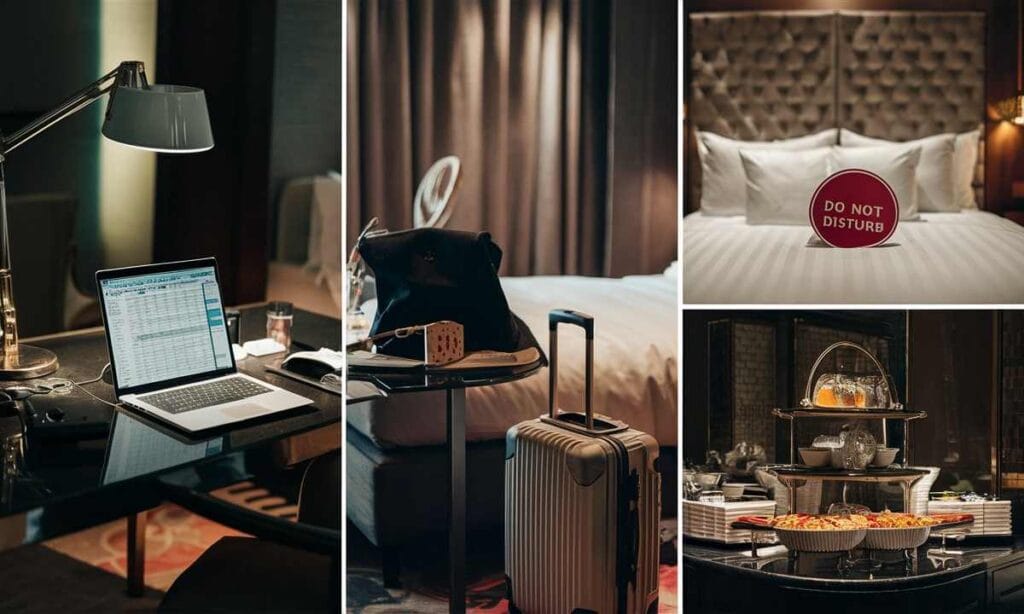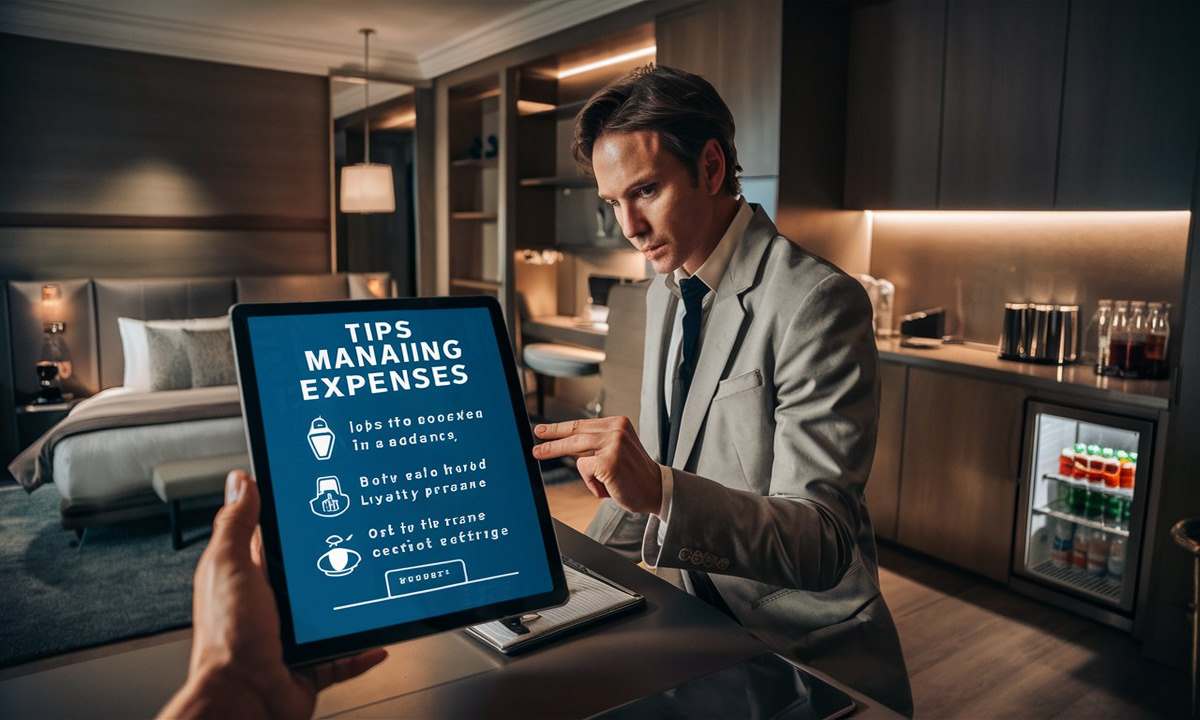Takin in the Importance of Budgeting for Business Trips
Business travel is often a significant expense for companies, and hotel costs can constitute a large portion of these expenditures. Controlling hotel expenses is not only crucial for maintaining profitability but also for ensuring that travel budgets are used efficiently. Unchecked, hotel costs can quickly spiral out of control, leading to budget overruns that affect the bottom line. Understanding the importance of setting clear guidelines for hotel stays and sticking to them is key to financial discipline on business trips.

Common Pitfalls that Lead to Overspending on Hotel Stays
Despite careful planning, business travelers often fall into common traps that inflate hotel bills. These can include last-minute bookings, which usually come with higher rates, or opting for convenience over cost-effectiveness by choosing hotels that offer more amenities than necessary. Additionally, travelers might not fully utilize corporate discounts or may incur extra charges from services such as room service, laundry, or premium internet access. Recognizing these pitfalls can help in making more informed decisions that keep costs down.
Setting a Realistic Budget for Your Hotel Stay
How to Estimate Hotel Costs Based on Location and Duration
The cost of a hotel stay can vary dramatically depending on the location and the length of your stay. Urban centers and popular destinations typically command higher prices, especially during peak seasons or major events. It’s essential to research and estimate these costs ahead of time by comparing prices across different hotels and booking platforms. Consider the length of your stay, as some hotels offer discounts for extended stays, which can be a cost-saving opportunity.

Factoring in Hidden Costs and Unexpected Expenses
When budgeting for a hotel stay, it’s important to account for hidden costs that can add up quickly. These might include resort fees, parking charges, taxes, and service fees. Additionally, unexpected expenses such as extended stays due to travel delays or unplanned meals at the hotel can also affect the overall cost. Building a cushion into your budget for these unforeseen expenses ensures that you won’t be caught off guard.
Choosing the Right Hotel for Your Business Trip
Researching Hotels Based on Business Needs
Selecting a hotel that aligns with your business needs is critical to both comfort and efficiency during your trip. Look for hotels that offer business amenities such as high-speed internet, meeting rooms, and workspaces. Proximity to your meeting locations or clients’ offices can also reduce transportation costs and time. Balancing these needs with the cost is crucial; sometimes, a slightly more expensive hotel can save money and time by reducing the need for additional transportation.
Balancing Cost and Convenience in Hotel Selection
While it might be tempting to book the cheapest available option, it’s important to weigh the cost against the convenience offered by the hotel. A hotel located far from your business meetings or lacking essential amenities might lead to additional expenses and wasted time. The goal is to find a hotel that provides the best combination of cost-effectiveness, convenience, and the necessary services to support your business activities.

Leveraging Corporate Discounts and Loyalty Programs
How to Find and Utilize Corporate Rates and Special Offers
Many hotels offer corporate rates or special discounts for business travelers, which can significantly reduce the cost of your stay. These rates are often available to employees of certain companies or members of specific professional organizations. To take advantage of these offers, be sure to inquire about corporate rates when booking and present any required identification or membership information at check-in.
The Benefits of Joining Hotel Loyalty Programs for Frequent Travelers
If you travel frequently for business, joining hotel loyalty programs can offer substantial savings and added benefits. Loyalty programs often provide perks such as free room upgrades, complimentary Wi-Fi, and late check-outs, which can enhance your stay without additional cost. Accumulating points through these programs can also lead to free stays or discounts on future trips, further reducing your overall travel expenses.
Booking Strategies to Save on Hotel Costs
Timing Your Booking for the Best Rates
Timing can have a significant impact on the cost of your hotel stay. Booking too early or too late can both result in higher prices. Understanding the booking window that typically offers the best rates—often one to three months before your stay—can help you secure a good deal. Additionally, avoiding peak travel times or choosing mid-week stays instead of weekends can lead to lower rates.
How to Use Flexible Dates to Find Lower Rates
Flexibility with your travel dates can be a powerful tool in reducing hotel costs. If your business trip dates are not fixed, use booking platforms that allow you to compare rates across a range of dates. Shifting your stay by just a day or two can sometimes result in significant savings. Additionally, consider booking refundable rates that allow you to rebook at a lower price if rates drop closer to your travel date.
Exploring Alternative Accommodation Options
Comparing Traditional Hotels with Alternatives Like Serviced Apartments
While traditional hotels are the go-to option for many business travelers, alternative accommodations such as serviced apartments can offer more space, kitchen facilities, and often lower costs for longer stays. These alternatives can be particularly beneficial if you need to stay in one location for an extended period, as they provide a more homely environment and the ability to prepare your meals, reducing dining expenses.
Pros and Cons of Staying in Budget-Friendly Hotels
Budget-friendly hotels can be an excellent way to save money, but they often come with trade-offs in terms of amenities and services. While they might lack luxury features, many budget hotels still offer essential services such as free Wi-Fi and breakfast, which can be sufficient for a short business trip. However, it’s important to read reviews and check for cleanliness, safety, and the availability of basic business services before booking.

Utilizing Travel Booking Tools and Apps
Top Apps and Websites for Finding Deals on Hotel Stays
In the digital age, numerous apps and websites specialize in finding the best hotel deals. Tools like Kayak, Google Hotel Search, and HotelTonight allow you to compare prices across multiple platforms, set price alerts, and even find last-minute deals. Using these tools can help you secure the best possible rate for your business trip, often with added benefits like no cancellation fees or exclusive discounts.
How to Set Up Alerts for Price Drops and Special Promotions
Setting up price alerts through travel apps or websites can notify you of any price drops or special promotions for your selected hotel. This feature is particularly useful if you have flexibility with your booking timeline, as it allows you to monitor rates and book when prices are at their lowest. Additionally, subscribing to hotel newsletters or travel deal websites can give you early access to promotions and discounts.
Maximizing Value During Your Hotel Stay
Negotiating Perks and Upgrades at Check-In
Once you arrive at your hotel, don’t hesitate to ask for complimentary upgrades or additional amenities. Hotel staff often have the discretion to provide room upgrades, free breakfast, or late check-out, especially if the hotel isn’t fully booked. A polite request at check-in can lead to a more comfortable stay without increasing your costs.
Tips for Getting More Value Without Spending Extra
To maximize the value of your stay, make full use of all the amenities included in your room rate. This might include taking advantage of the fitness center, enjoying the complimentary breakfast, or using the business center for work-related tasks. Additionally, consider asking the concierge for recommendations on free or low-cost local attractions, which can enhance your travel experience without adding to your expenses.
Taking Advantage of Hotel Amenities to Save Money
Utilizing Complimentary Breakfast, Wi-Fi, and Other Included Services
Many hotels offer complimentary breakfast, which can save you the cost of eating out in the morning. Similarly, free Wi-Fi and access to business centers can eliminate the need for additional data charges or renting office space. By choosing hotels that include these services in their room rate, you can reduce your daily expenses while still enjoying a productive and comfortable stay.
How to Make the Most of Hotel Facilities for Business Purposes
Hotels often provide facilities such as meeting rooms, printers, and workspaces that can be invaluable for business travelers. Rather than renting a separate office space or meeting venue, utilize the hotel’s facilities to conduct meetings or work sessions. Some hotels even offer business packages that include the use of these facilities at a discounted rate, making it easier to manage your work while on the road.
Reducing Meal Costs While Traveling
Strategies for Minimizing Dining Expenses During Your Stay
Dining out for every meal can quickly add up, especially in high-cost cities. To minimize these expenses, consider purchasing snacks and drinks at local grocery stores or using a hotel room with kitchen facilities to prepare simple meals. Additionally, look for hotels that offer meal packages or dining discounts as part of your stay, which can provide better value than dining out for every meal.
Finding Affordable Dining Options Near Your Hotel
Researching affordable dining options near your hotel before your trip can help you avoid expensive restaurants and tourist traps. Apps like Yelp or TripAdvisor can guide you to local eateries that offer good food at reasonable prices. If your hotel has a concierge, ask for recommendations on where to find budget-friendly meals that still offer a taste of the local cuisine.
Expense Tracking and Management
Keeping Track of Your Hotel Expenses
Maintaining a detailed record of your hotel expenses is crucial for managing your budget and ensuring that you stay within company guidelines. Use expense tracking apps like Expensify or Concur to log your receipts and categorize your expenses. This not only helps in tracking your spending but also simplifies the reimbursement process after your trip.
Best Practices for Documenting and Categorizing Hotel-Related Costs
To avoid confusion and ensure accurate reimbursement, document each expense as soon as it occurs. Categorize your expenses by type, such as lodging, meals, or transportation, and keep all receipts organized in a single place. If your company requires specific documentation for reimbursement, make sure you follow these guidelines meticulously to avoid any delays or issues in getting reimbursed.
Understanding Your Company’s Expense Reimbursement Policies
Key Points to Check in Your Company’s Travel Expense Policy
Before embarking on your business trip, familiarize yourself with your company’s travel expense policy. Key points to check include the maximum allowable rates for hotel stays, the types of expenses that are reimbursable, and the documentation required for reimbursement. Understanding these guidelines will help you make informed decisions during your trip and ensure that all your expenses are covered by your company.
Ensuring Your Expenses Align with Company Guidelines
Adhering to your company’s travel expense policy is essential for smooth reimbursement. Avoid exceeding the maximum allowable rates for hotels and be cautious about incurring expenses that might not be covered, such as room service or premium internet access. If you have any doubts about a particular expense, it’s better to consult your company’s travel coordinator or manager before making the purchase.
Minimizing Additional Hotel Fees
Avoiding Common Extra Charges
Hotel bills can sometimes include unexpected extra charges, such as resort fees, minibar items, or charges for using the fitness center. To avoid these additional costs, inquire about any potential fees at check-in and avoid using services that come with a surcharge. Being aware of these potential charges can help you keep your hotel bill under control.
How to Dispute Charges That You Believe Are Unfair
If you notice any charges on your final bill that seem unfair or were not clearly communicated to you, it’s important to address them immediately. Politely but firmly request a review of the charges with the hotel’s billing department. If the issue is not resolved to your satisfaction, consider escalating the matter to the hotel’s management or your company’s travel department.
Managing Transportation Costs to and from the Hotel
How to Choose Hotels with Convenient Transportation Options
Selecting a hotel with convenient access to public transportation, or within walking distance of your business destinations, can significantly reduce transportation costs. This not only saves money on taxis or rideshares but also reduces travel time, making your trip more efficient. Consider the availability of shuttle services provided by the hotel, which can also be a cost-effective option for getting around.
Ways to Minimize Costs Related to Taxis, Rideshares, and Parking
If you need to use taxis or rideshares during your trip, compare prices across different platforms to find the most cost-effective option. Some cities offer shared ride services that can reduce the fare by allowing you to share a ride with other travelers. If you’re driving, look for hotels that offer free or discounted parking to avoid expensive daily parking fees.
Planning Ahead to Prevent Last-Minute Expenses
Packing Essentials to Avoid Purchasing at the Hotel
Forgetting to pack essential items can lead to unnecessary expenses when you’re forced to buy replacements at inflated hotel or airport prices. Create a detailed packing checklist before your trip, including items like toiletries, chargers, and business materials, to ensure you have everything you need. Packing efficiently can save both time and money by reducing the need for last-minute purchases.
Creating a Comprehensive Packing Checklist for Business Trips
A well-organized packing checklist is crucial for ensuring that you have all the necessary items for your business trip. Include categories for clothing, electronics, documents, and personal care items. Double-check your list before you leave to avoid forgetting anything essential. This proactive approach will help you stay organized and avoid the stress and cost of buying forgotten items on the go.
Preparing for International Business Travel
Special Considerations for Managing Expenses in Foreign Countries
International business travel comes with unique challenges, including managing expenses in different currencies and dealing with varying cost structures. Research the cost of living in your destination country to better anticipate expenses for meals, transportation, and accommodations. Additionally, be mindful of currency exchange rates and transaction fees, which can impact the overall cost of your trip.
Tips for Handling Currency Exchange and International Transaction Fees
To minimize the impact of currency exchange rates and transaction fees, consider exchanging money before you leave or using a credit card that offers favorable exchange rates with no foreign transaction fees. Avoid exchanging money at airports or hotels, where rates are often less favorable. Instead, look for local banks or ATMs that offer better exchange rates with lower fees.
Post-Stay Expense Management
Reviewing Your Final Hotel Bill
Before checking out of your hotel, review your final bill carefully to ensure that all charges are accurate. Look for any discrepancies, such as charges for services you didn’t use or incorrect rates. Address any issues immediately with the hotel’s billing department to resolve them before you leave. A thorough review can prevent surprises when you submit your expenses for reimbursement.
What to Do If You Find Discrepancies or Errors on Your Bill
If you find discrepancies or errors on your bill, bring them to the attention of the hotel staff right away. Keep a record of your conversations and any supporting documentation, such as receipts, to back up your claims. Most hotels are willing to correct mistakes promptly, but it’s important to address these issues before you leave to avoid delays in the reimbursement process.
Submitting Expenses for Reimbursement
Steps to Ensure a Smooth and Timely Reimbursement Process
To ensure a smooth and timely reimbursement process, submit your expenses as soon as possible after returning from your trip. Organize your receipts and documentation according to your company’s guidelines and provide clear explanations for any unusual expenses. Prompt and accurate submissions help avoid delays and ensure that you’re reimbursed quickly for your out-of-pocket costs.
How to Organize Receipts and Documentation for Easy Submission
Organizing your receipts and documentation is essential for a hassle-free reimbursement process. Use folders or digital tools to categorize your expenses by type, and ensure that all receipts are legible and complete. If you’re using digital receipts, make sure they’re saved in an easily accessible format and backed up in case of any technical issues.
Long-Term Strategies for Managing Business Travel Expenses
Learning from Past Business Trips
Each business trip offers valuable lessons that can help you manage expenses more effectively in the future. After each trip, take the time to evaluate what worked well and what didn’t, and make adjustments for your next trip. Keeping a log of successful strategies and common pitfalls can help you refine your approach to travel budgeting over time.
Conducting Post-Trip Evaluations to Improve Future Expense Management
A post-trip evaluation is a useful tool for improving your expense management skills. Review your budget and actual expenses to identify any discrepancies and understand the reasons behind them. This analysis can help you make more informed decisions on future trips, ensuring that you stay within budget and maximize the value of your travel expenses.
Building Strong Relationships with Hotel Chains
How to Negotiate Better Rates and Perks as a Frequent Guest
Building strong relationships with hotel chains can lead to better rates and additional perks over time. If you frequently stay with a particular hotel chain, consider reaching out to their sales department to negotiate a corporate rate or additional benefits, such as free upgrades or late check-outs. Loyalty programs can also offer valuable rewards that enhance your travel experience without increasing costs.
The Benefits of Establishing Long-Term Partnerships with Hotel Brands
Establishing long-term partnerships with hotel brands can provide consistent savings and a more personalized travel experience. By regularly staying with the same brand, you can build a relationship that leads to better service, exclusive offers, and the opportunity to earn points or rewards. These partnerships can also simplify the booking process, making it easier to plan and budget for future trips.
BOTTOM LINE
Recap of Essential Tips for Managing Hotel Expenses
Effectively managing hotel expenses on a business trip requires careful planning, attention to detail, and the willingness to leverage available resources. From setting a realistic budget to maximizing value during your stay, each step plays a crucial role in keeping costs under control. By implementing these strategies, you can ensure that your business trips are both productive and cost-effective.
Encouragement to Implement These Practices on Future Business Trips
The next time you plan a business trip, remember the strategies discussed in this article. Implementing these practices can lead to significant savings and a more streamlined travel experience. With a proactive approach to expense management, you can focus on the business at hand, confident that your hotel costs are well within budget.
Taking Action on Cost Management
To take action on cost management, start by reviewing your current travel practices and identifying areas for improvement. Use the tips and strategies outlined in this article to refine your approach and make smarter decisions on your next business trip. With careful planning and execution, managing hotel expenses can become a straightforward and stress-free part of your travel routine.
Frequently Asked Questions (FAQs)
How to Choose the Best Hotel for a Business Trip?
To choose the best hotel for a business trip, consider factors like location, amenities, and cost. The hotel should be conveniently located near your business meetings or conference venues to minimize travel time. Look for hotels that offer essential business amenities such as high-speed Wi-Fi, a business center, and meeting rooms. Additionally, compare prices and read reviews to ensure you’re getting the best value for your money. Finally, consider the hotel’s reputation and brand consistency, especially if you have preferred chains that offer loyalty programs or corporate discounts. source
What Amenities Should a Business Hotel Offer?
A business hotel should offer several key amenities to ensure a productive and comfortable stay. High-speed internet access is crucial for conducting work remotely and staying connected. A fully equipped business center with printing, copying, and faxing services is also important. Meeting and conference rooms should be available for hosting business gatherings. Other essential amenities include on-site dining options, a fitness center to help you unwind, and convenient transportation services like airport shuttles or car rentals.
How to Find Affordable Business Hotels?
To find affordable business hotels, start by comparing prices across multiple booking platforms. Use filters to sort hotels by price, but also consider the value of included amenities like breakfast, Wi-Fi, or airport shuttles. Booking during off-peak times or being flexible with your dates can also lead to better rates. Look for corporate discounts or loyalty programs that offer reduced rates or additional perks for business travelers. Don’t forget to read reviews to ensure that the lower cost doesn’t come at the expense of quality. source
What Are the Top Hotel Chains for Business Travelers?
Top hotel chains for business travelers typically offer consistent service, extensive amenities, and loyalty programs. Marriott, Hilton, and Hyatt are among the most popular choices, known for their global presence and business-oriented facilities. These chains often provide dedicated workspaces, high-speed internet, and meeting rooms tailored to business needs. Additionally, their loyalty programs can offer valuable rewards, such as free nights or room upgrades, which are particularly beneficial for frequent travelers. Business travelers also appreciate the reliable quality and customer service these hotel chains consistently deliver.
How to Book a Hotel for a Business Trip?
Booking a hotel for a business trip involves several steps to ensure a smooth and successful stay. First, determine the location based on proximity to your business meetings or events. Use booking platforms to compare prices, amenities, and reviews. Consider any corporate discounts or loyalty programs that may apply. Once you’ve selected the hotel, book directly through the hotel’s website or a trusted third-party platform to secure the best rate. Confirm the reservation details, including check-in and check-out times, and request any specific needs like early check-in or a quiet room.
What Are the Benefits of Staying at a Business Hotel?
Staying at a business hotel offers several benefits, including access to amenities tailored to professional needs. These hotels typically offer high-speed internet, business centers, and meeting rooms, making it easier to conduct work away from the office. Business hotels are often located in central areas, close to business districts or conference centers, reducing commute time. They also tend to have quiet rooms and services like express check-in/out, which cater to the busy schedules of business travelers. Additionally, many business hotels offer loyalty programs with perks that can be advantageous for frequent stays.
How to Earn Rewards Points on Business Hotel Stays?
Earning rewards points on business hotel stays can be achieved by joining a hotel’s loyalty program. Start by enrolling in the program before booking your stay. Always book directly through the hotel’s website or app to ensure that your stay qualifies for points. Use a credit card that offers additional points or cash back on travel purchases. Some programs allow you to earn bonus points for extended stays or by using specific hotel services, such as dining or spa treatments. Accumulated points can then be redeemed for free nights, room upgrades, or other rewards. source
What Safety Measures Should Be Considered in a Business Hotel?
When choosing a business hotel, safety should be a top priority. Look for hotels that have 24-hour security, secure keycard access to rooms and elevators, and well-lit common areas. The hotel should also have fire safety measures, such as smoke detectors, fire extinguishers, and clear evacuation plans. Check whether the hotel offers in-room safes to store valuables and whether the staff is trained to handle emergencies. Reading reviews and checking the hotel’s safety ratings can also provide insight into its security measures.
What Is the Difference Between a Business Hotel and a Regular Hotel?
A business hotel is specifically designed to cater to the needs of business travelers, offering amenities like high-speed internet, meeting rooms, and business centers. These hotels are often located in or near business districts, making them convenient for work-related activities. Regular hotels, on the other hand, may not prioritize business amenities and might cater more to leisure travelers. While both types of hotels offer comfortable accommodations, business hotels focus more on efficiency, convenience, and services that support work-related tasks, such as early check-in/check-out options and quiet rooms for uninterrupted work.









